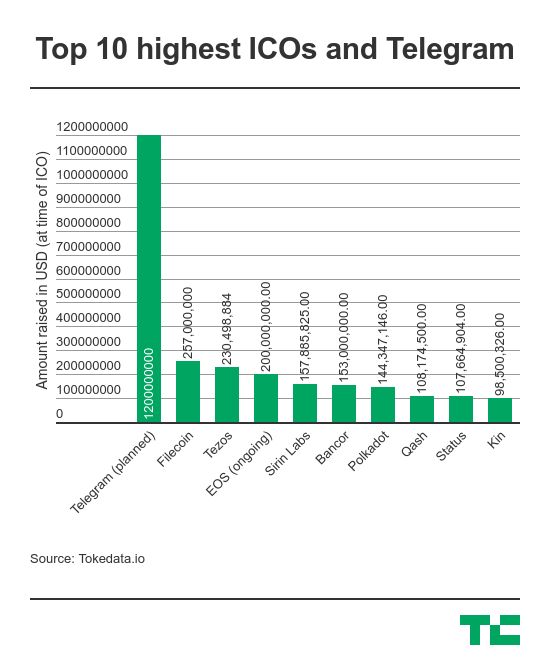We have even more information about messaging app Telegram’s plans for cashing in on its popularity within the crypto community with the massive ICO for its proposed Telegram Open Network (TON) project (that we first reported), after obtaining the whitepaper and investor prospectuses in full.
From the documents, it is clear that Telegram isn’t content with sitting on a platform like Ethereum for its token sale and services, as most ICOs are. Instead, it wants to create a platform of its own to rival Ethereum for hosting a new wave of decentralized services and internet experiences tipped to emerge thanks to the blockchain.
Telegram’s ICO will be a record if all goes according to plan, but that’s only the start.
The company plans to raise a staggering $1.2 billion in total, starting with a $600 million pre-sale that’s strictly for traditional venture capital backers and those inside its executive’s close circles. That first stage is running from January to February by invite-only, according to the letters sent to selected participants that were viewed by TechCrunch.
Following the pre-sale, the firm plans to hold a public sale in March which will allow retail investors to enter. The public sale is pegged at $600 million, which would make the overall ICO worth $1.2 billion. That blows any other token sale out of the water, and it would easily surpass the current record of $257 million raised by Filecoin in September.

Beyond money, the ICO will be notable for a product with far greater traction among consumers than any other token sale project to date. As explained in the prospectus, Telegram is on track to surpass 200 million active users this year:
In October 2017, Telegram reached 170 million monthly users, delivering 70 billion messages every day. At least 500000 new users join Telegram daily. At this rate, the service is expected to hit 200 million monthly users in Q1 2018. These users can provide the required critical mass to push cryptocurrencies towards widespread adoption
Ambitions to run the decentralized web
Telegram is best known for a messaging app, which the company claims in the documents is used for community communication in over 60 percent of ICO projects, but its own ICO is more extensive than monetizing that chat service.
The company is planning to develop the building blocks for a decentralized internet that could eventually power decentralized apps (known as DApps), smart contacts, censorship-proof websites and more.
The pitch includes four components, as we previously reported:
- Distributed file storage akin to services like Dropcoin and ICO company Filecoin
- A proxy service for creating decentralized VPN services and TOR-like secure browsing environments based on the blockchain
- Services for decentralized apps, smart contracts and decentralized web browsing experiences
- Payments for micropayments and peer-to-peer transactions
Putting these components together could allow Telegram to be the base for a new range of decentralized apps and services based on the blockchain. It could turn Telegram from a messaging app into a platform that hosts internet-based content which could, in theory, operate micro-paywalls that let users unlock news or subscriptions for small amounts of crypto payment, while there’s also the potential to become a major payment hub.
TON will provide the backbone for new kinds of internet services while also allowing existing social networks and messaging apps to join in, too.
Telegram said its services play, which lets other developers build apps and services on top of TON, can “be a gateway to blockchain-based projects for the masses — similar to how Google Play and the App Store currently work for centralized applications.”
All of these goals, of course, require technology and Telegram’s 132-page whitepaper goes into much detail on that. Those technologies outlined in the whitepaper aren’t deployed by other projects right now, so they will require some time for development, but they are based on, or inspired by, ongoing efforts from other blockchain companies that remain in progress.
Blockchain developers who spoke to TechCrunch were underwhelmed by the lack of new technology in the whitepaper, claiming that it mostly uses theories from existing projects rather than pushing the envelope.
More details in full, as we reported last week:
The “TON Blockchain” will consist of a master chain and 2-to-the-power-of-92 accompanying blockchains. Its most notable aspect is that it will have an “Infinite Sharding Paradigm” to achieve scalability. Thus, TON blockchains aim to be able to “automatically split and merge to accommodate changes in load”. This would mean new blocks are generated quickly and “the absence of long queues helps keep transaction costs low, even if some of the services using the platform become massively popular”.
It will also consist of “Instant Hypercube Routing” designed so the blockchain can maintain top speed even as it grows. Its proof of stake approach will reach consensus through a variant of the ‘Byzantine Fault Tolerant’ protocol, again increasing speed and efficiency. And it will also use 2-D Distributed Ledgers. This means the TON can grow new valid blocks on top of any blocks that were proven to be incorrect to avoid any unnecessary forks. In other words, TON aims to be ‘self-healing’.
TON’s third generation blockchain will be based on a dynamic ‘proof of stake’ secured by multiple parties with a high degree of fault tolerance. It will also handle storage of ID, payments and smart contracts. So, instead of relying on proof of work to create its currency, Telegram will rely on a new, less energy-hogging way of mining cryptocurrency than the original Bitcoin method.
The claim is that it will be capable of a vastly superior number of transactions, around 1 million per second. In other words, similar to the ambitions of the Polkadot project out of Berlin — but with an installed base of 180 million people. This makes it an ‘interchain’ with so-called ‘dynamic sharding’.

Telegram CEO Pavel Durov speaking at TechCrunch Disrupt San Francisco
Huge discounts and a long wait
Once news of the project got out, most interest focused around the token sale itself with many investors sure the project will be a hit based on hype alone.
For the sale itself, Telegram is proposing to create five billion Gram tokens — which it plans to use the 💎 symbol for — to be distributed as follows:
- 10 percent held as incentives to develop the platform, including developer incentives
- 4 percent kept for remunerating the developer team
- 42 percent retained by the TON Reserve during the initial stages of the project in order to “protect the nascent cryptocurrency from speculative trading and to maintain flexibility at the early stages of the evolution of the system.”
- 44 percent will be tradable, Telegram said
A recent trend in ICOs, also known as token sales, is to offer large discounts in the pre-sale phase to encourage large investors — known as Whales — to contribute. Telegram is requiring a minimum investment of $20 million for that — a number that is way higher than any other token sale to date — with discounts of more than 50 percent for those who take part. According to a document for investors, Telegram believes the pre-sale discount could exceed 70 percent of the final token price although the final numbers aren’t confirmed. That is insane.
With the final public sale price targeted at $0.97, that could mean some whales pay as little as $0.31, according to the prospectus.
Due to those enormous discounts, Telegram is proposing a varied lock-up period that would see the investors who enjoyed the largest discount unable to sell their tokens. Details are still being worked out, but lock-up periods could range from three to 18 months dependent on discount, with an option for partial lock-up, too.
There will be an uncharacteristically long delay before investors, both pre- and public, get their hands on their tokens. Telegram plans to release the Grams in December, with a schedule of January-March 2019 for when they will list on exchanges, thereby becoming available for everyone else and, crucially for investors, tradable.
Product roadmap
Plenty of ICOs are rightly accused of trading on hype and developing multi-billion dollar market caps for their coins without actually offering a product.
Telegram’s token sale will take place before the company’s product is available, but the tokens themselves will be released after a number of features according to the company’s rough guideline as shared with investors:
- Q1 2018 — secure ID launch
- Q2 2018 — MVP of test of network of TON
- Q3 2018 — testing and security audit for TON
- Q4 2018 — stable version of TON deployed
- Q4 2018 — Telegram wallet launched
- Q1 2019 — TON-based economy goes live inside Telegram
- Q2 2019 — TON services, storage and proxy launched
By 2021, Telegram plans to step back and rename TON to ON with the network managed by its foundation. That’s not an entirely uncommon goal for token sale projects.
“Telegram will serve as a launch pad for TON, ensuring its technological superiority and widespread adoption on the initial stages, but the future of TON is in the hands of the global open-source community,” the company wrote in the whitepaper.
Unprecedented ICO
There’s a lot to unpack from the Telegram ICO, but it is clear that early reports of plans to develop its service into WeChat undersold the sheer ambition of this project.
Acutely aware of the unique position that their company occupies as the go-to app for the crypto community, Telegram’s founders are aiming to develop a platform of comparable scale to Ethereum and the many “Ethereum killers” that have launched over the past year or so. This ICO isn’t just designed to (finally) make money from the Telegram messaging app, it aims to build a platform for future ICOs, future cryptocurrencies, future decentralized applications and a new kind of censorship-proof internet system.
The question — like all ICOs — is whether the theory can become reality. Certainly on the tech-side, Telegram’s processes and protocols remain in development. The product roadmap reflects that and the big launches won’t happen until later this year (the Telegram wallet) and early 2019, when the TON-based economy goes live, which means there are no major clues as to when the public component of the token sale opens.
Given the fact that few ICOs even have a product in the market, let alone one with 170 million active users, you can expect that crypto-focused investors will be keen to grab a slice of this sale. How the pre-sale fares among more traditional VCs will also be one to watch.
Disclosure: The author owns small amounts of cryptocurrency including ETH.































Comment